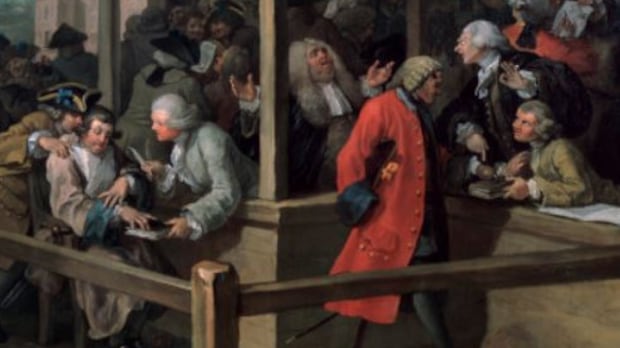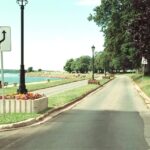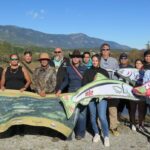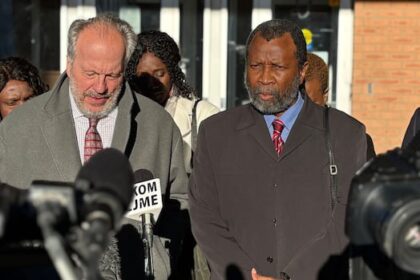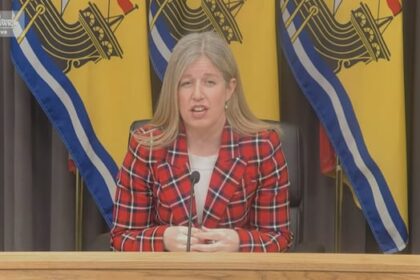When it comes to democracy, New Brunswick’s first ride was more than a little bumpy.It was 240 years ago this week that politicians first hit the campaign trail in the newly established British colony.Greg Marquis, a history professor at the University of New Brunswick Saint John, said two words sum up the 1785 campaign: “contested” and “rowdy.”“I think a lot of these colonial-era elections were rowdy,” said Marquis. But as for New Brunswick’s first one, he added, “It’s a little over the top even by the standards of the 18th century.”The making of New BrunswickBefore 1884, the land that makes up modern New Brunswick was a part of Nova Scotia. That quickly changed at the conclusion of the American Revolution.An influx of United Empire Loyalists, who had sided with the British in the conflict, caused the British North American colony’s population to swell, to the point that it was thought best to split Nova Scotia into two pieces.With more Loyalists arriving in Britain’s remaining North American colonies, splitting off a new one was necessary. (Library and Archives Canada)Thomas Carleton, the new colony’s first lieutenant-governor, got to work organizing things, but at a leisurely pace.“One of his instructions … was to call upon an assembly and the necessary election when he thought it would be suitable,” said Lyle Skinner, a constitutional lawyer. “Although New Brunswick was created in 1784, he only found it suitable for that to happen in 1785.”A looming electionThe election was called on Oct. 15 so that members could be elected on Nov. 7, in time for the opening of the colony’s first 26-seat legislative assembly in Saint John early the following year.The process looked a lot different than elections do today.“There was no Elections New Brunswick. There was no law you could read that would outline how an election would be conducted,” said Skinner.There were no ridings, so multiple representatives were elected in each of the colony’s eight counties.An election announcement posted in The Royal Gazette. (University of New Brunswick/New Brunswick Historical Newspapers Project)Only white men 21 years or older could vote, but the traditional requirement at the time for voters to own land was waived. Instead, voters merely needed to have lived in the area for three months.“That influx of Loyalists caused a problem; nobody in 1785 really owned land,” said Skinner. “When the first election laws were created a few years later, that shrunk back down to… men who owned property.”Polls were held wherever the sheriff felt like holding them, and they were open until the sheriff felt he’d received all the local votes before moving the poll somewhere else.There were no political parties and no secret ballot. A voter would verbally say who he was voting for, in front of everyone.“You went to the polling station, declared your support for Candidate X, and Candidate Y might have 10 guys with clubs, you know, standing outside,” said Marquis.Best-laid plansThe new lieutenant-governor had envisioned a form of democracy in New Brunswick that would be subdued and deferential.“Carleton hoped to get a house of ‘worthy’ members, men who would corroborate the decisions he had taken,” wrote historian W.S. MacNutt in his book New Brunswick, A History.But there was a hitch in Carleton’s plan when it came to the colony’s biggest community at the time. Saint John was divided into two groups of people: the Upper Covers and the Lower Covers.Thomas Carleton wanted one kind of assembly member; the Lower Covers wanted another. (Provincial Archives of New Brunswick, P37-309)“The Upper Cove people were more around… what later became Market Slip, King Street … They were a bit wealthier, a bit better connected,” said Marquis.“You had the Lower Covers a bit further down the harbour … They were more small business and workers.”Carleton had planned on Upper Covers being elected to fill Saint John County’s six seats, but the Lower Covers fought back.“It was government men against those who had not been admitted to privilege… patricians against plebeians, Upper Covers against Lower Covers,” wrote McNutt.The dispute between the Upper and Lower Covers would soon turn violent.Divisions in Saint John would lead to riots and violence over who should represent the city and county. (Library and Archives Canada)After a poll was held at McPherson’s Tavern, the de facto Lower Cove headquarters, the poll was moved to another tavern in the Upper Cove’s stomping grounds, Mallard House.An altercation at McPherson’s had fired up a mob that made the short hike to Mallard House, where a riot soon broke out.Historian David Bell, in his book Loyalist Rebellion in New Brunswick, quoted an eyewitness of the event: “The mob … made a general attack upon the house with stones and brick-bats, and soon demolished all the windows.”Troops from the nearby Fort Howe soon restored order.Contentious scrutiny The result of the vote was a blow to Carleton and the Upper Cove. Lower Covers handily defeated the Upper Covers, taking all six seats.The Upper Covers demanded a “scrutiny” — essentially a recount in which the eligibility of individual voters was scrutinized.It turns out that the sheriff, the appointed scrutineer and an Upper Cover, managed to find many ineligible Lower Cove voters, but not surprisingly, no ineligible Upper Cove voters.’I think a lot of these colonial-era elections were rowdy,’ said Greg Marquis, a UNBSJ prof, adding that the 1785 vote in New Brunswick was over the top even by those standards. (Mike Heenan/CBC)After the dubious scrutiny, Saint John County ended up sending six Upper Covers to the provincial assembly.The Lower Covers petitioned the government about the injustice but the assembly, friendly to the Upper Cove, rejected the plea.Unfortunately, this was not the only miscarriage of justice in the election. Many Acadians were disenfranchised because of their religion. The local sheriff didn’t really follow the paperwork.- Lyle Skinner, constitutional lawyerThere was a law saying that Roman Catholics had a right to vote as long as they swore allegiance to the King, but in the end, it didn’t matter.“[The vote] was administered by the local sheriff, so the local sheriff didn’t really follow the paperwork,” said Skinner.Democracy evolvingNew Brunswick’s 1785 election wasn’t exactly democracy’s finest hour, but Skinner said there were some important takeaways. “It’s sort of a historical footnote, but it does show an evolution towards democracy being more accessible,” he said. ‘It’s sort of a historical footnote, but it does show an evolution towards democracy being more accessible,’ said Lyle Skinner, a constitutional lawyer. (Submitted by Lyle Skinner)“Unfortunately, it was a blip on the radar as opposed to an immediate trend towards a more fair voting process.”Marquis said the election also challenges the traditional view many historians have of the United Empire Loyalists.“That older view that we might have had of the Loyalists being sedate, law-abiding, civilized people who didn’t agree with all this American Revolution stuff … very refined and sedate … it shows that, no, they were very human,” said Marquis.
240 years ago this week, New Brunswick launched a ‘rowdy’ 1st election campaign
